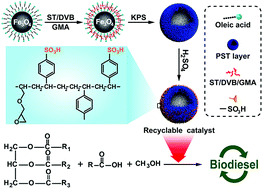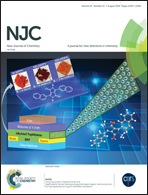Sulfonated poly(styrene-divinylbenzene-glycidyl methacrylate)-capsulated magnetite nanoparticles as a recyclable catalyst for one-step biodiesel production from high free fatty acid-containing feedstocks†
Abstract
The decrease in fossil fuel resources and the negative environmental impact of greenhouse gas emissions from their combustion have stimulated interest in finding alternative energy resources. Of various alternatives, biodiesel is surging in popularity given its renewability and lower environmental impact. Herein, magnetite nanoparticles were prepared by a chemical co-precipitation technique, and then capsulated with a sulfonated poly(styrene-divinylbenzene-glycidyl methacrylate) copolymer, yielding a recyclable catalyst suitable for biodiesel production from high free fatty acid-containing feedstocks, such as waste or recycled oil. The morphology and structure of the resultant catalyst were characterized by multiple techniques, and the influence of catalyst dose, temperature, molar ratio of methanol to feedstock oil, and free fatty acid content on the biodiesel yield was evaluated, respectively. The results indicated that this catalyst was capable of catalyzing the transesterification of triglycerides and the esterification of free fatty acids simultaneously, enabling a simple, one-step procedure for biodiesel production from feedstocks containing a high content of free fatty acids. Under the optimal conditions, the biodiesel yield was found to reach 91.1%. In addition, such a catalyst was proved to be easily recyclable under an external magnetic field, and reusable, which promised its potential application in the environmentally-benign production of biodiesel from cheap waste or recycled oil.



 Please wait while we load your content...
Please wait while we load your content...